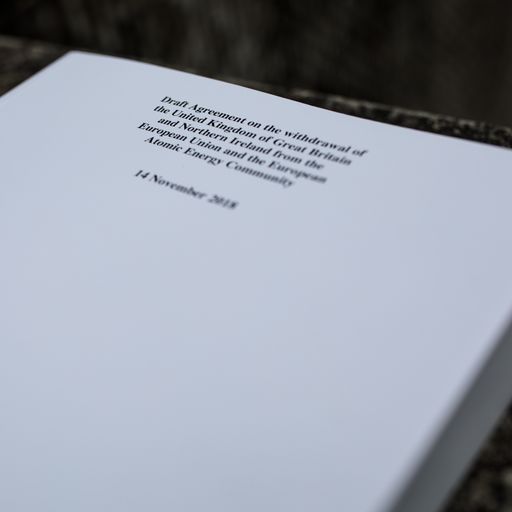09:25, UK,Friday 16 November 2018
Jason Farrell
Home editor
 |
| Theresa May's draft agreement is 585 pages long |
The 585-page draft withdrawal agreement could become the most important document of recent times, setting rules and regulations and forming the foundation of our relationship with the EU.
Or it could end up in the bin.
Either way someone had to read it and I drew the short straw.
There is plenty to chew on, but I'm going to start with something we haven't discussed much in the political maelstrom of the last 24 hours - security.
Article 62 (p103), suggests there will be a criminal co-operation cliff-edge after the transition period.
As things stand, our ability to apply the European Arrest Warrant looks set to end in January 2021 as will our access to the European Criminal Records Information System, which allows countries to easily share conviction details on suspects.
The draft withdrawal agreement also suggests that we will lose access to the Secure Information Exchange Network Application (SIENA).
This contains a tool to share information on terrorist activity.
The agreement says the UK "shall be entitled to use (it), for no longer than one year after the end of the transition period".
It also makes clear that there would be a kind of pay-as-you-go charge for accessing the system in this final year, with the UK reimbursing the Union "for the actual costs incurred by the Union as a consequence of facilitating the United Kingdom's use of SIENA (p108)".
Reacting to this, a security source told Sky News: "The Secure Information Exchange Network Application is essentially a database of people and groups who are a threat to the security of Europe.
The Brexit withdrawal agreement has a few areas of controversy - @JasonFarrellSky explains what article 6 could mean to the UK...
Read the key points of the deal here: po.st/5I1AFh pic.twitter.com/U9GdpIYjL9
Read the key points of the deal here: po.st/5I1AFh pic.twitter.com/U9GdpIYjL9
"The UK prides itself for having the best security services in Europe.
"In fact, we provide most of the intelligence that ends up in this database.
"Europe relies on our security services to keep the union safe.
"The idea that we now have to pay for access to our own security intelligence is outrageous.
"It's beyond a farce.
"This news has not gone down well at all."
Politically the thing that has not gone down well at all is the so called "backstop", which if no other solution is found to the Irish border problem, creates "a single customs territory between the Union and the United Kingdom (p310)".
There are lots of reasons why this is creating the political heat you've seen in the last 24 hours.
First up, in the last two years no one has come up with a solution to the Irish border problem - so that makes the backstop seem quite likely.
Secondly, Theresa May said remaining in a custom's union with the EU was a red line.
Thirdly it would tie Northern Ireland to closer EU regulations than the rest of the UK, and fourthly and most importantly, it doesn't look like there would be an easy way out of this customs arrangement once in it.
Page 330 contains the most controversial clause which confirms any attempt to get out of the backstop would have to be a joint decision between the UK and the EU.
That would leave the UK more tied into the customs union than it is now.
A joint committee comprising EU and UK representatives would be set up to consider an application to get out of the backstop, and it appears this committee would oversee other significant decisions that would affect the UK.
Page 363 for example suggests it would set the overall level of support that the UK could provide to its agricultural industry.
"The determination of the maximum exempted overall annual level of support and the minimum percentage shall be set by the joint committee."
Go to the Annex 2, page 337, and you see that under the customs arrangement the UK is also barred from making trade deals with third countries by for example applying lower tariffs or setting different rules of origin.
While at the same time if the EU decides to amend the commons tariff the UK has the honour of being "informed".
With no index and no discernible order to its clauses, I'll be honest this document is a tough read.
With no index and no discernible order to its clauses, I'll be honest this document is a tough read.
In places it is intriguing while also impenetrable.
For example, I spent some considerable time staring at the clause on page 328 referring to the Northern Ireland backstop which says: "If the application of this protocol leads to serious economic societal or environmental difficulties liable to persist, or to diversion of trade, the EU or the United Kingdom may unilaterally take appropriate measures."
I think this means there is one way the UK could independently get out of the backstop agreement - but only if all hell breaks loose.


